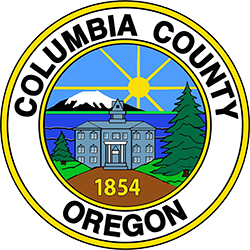Published on October 17, 2019

October 17, 2019
Do you know how it feels when you’re in a hurry, or have travelled a long way, and you come up to a “road closed” sign? Frustrating, right? Have you ever thought about going around those signs? Well, I’m here to tell you – DON’T!
If there’s one thing road managers hate to do, it’s close roads. But they do so for a reason – and very good reasons at that. Roads are closed when it’s unsafe to travel on them. Construction, flooding, and landslides are often the reason.
Construction workers need space to work, and when a road is closed, they know they can move about safely. A motorist driving up to or through a construction area can take them by surprise or hurt them, let alone cause other significant damage.
Mike Russell, Public Works Director for Columbia County, wants drivers to respect the "road closed" signs his workers post when they're working on bridges, resurfacing roads or replacing culverts. "Please remember that we are trying our best to keep everybody safe”, he said. A “road closed” sign should signal to drivers that there is danger beyond the sign."
In winter, when the snow and ice hits, Oregon’s rural roads can become treacherous. Road managers will close roads when snow is too deep, or when ice can’t melt because of the temperature or if trees shade the roadway from sun.
After a long winter of rain, spring melt and new storms can cause landslides or flooding. According to the Federal Emergency Management Agency, six inches of water will reach the bottom of most passenger cars, causing loss of control and potential stalling. A foot of water will float many vehicles, and two feet of rushing water will carry away larger vehicles such as SUVs and pickups.
Even with only a few inches of water flowing over a road, it’s hard to know what’s happening beneath the pavement. Entire sections of roadway can sweep away quickly. According to the National Weather Service, an average of 75 people in the U.S. died from flash floods each year from 2004-2013, with vehicle-related drowning more common than any other weather-related death. And according to Dr. Greg Forbes, a severe weather expert, almost two of every three U.S. flash flood deaths from 1995-2010, excluding fatalities from Hurricane Katrina, occurred in vehicles.
Floodwaters powerful enough to float or trap a vehicle are also dangerous to walk through. Just six inches of flowing water can knock you off your feet. This is particularly dangerous situation for the elderly and small children. So please, heed the warning of the National Weather Service - "Turn around, don't drown!"
Driving past “road closed” signs can cost in other ways too. Columbia County Sheriff’s Public Information Officer Brian Pixley said deputies will issue citations for drivers going past closed road signs. “It’s a common problem,” he said, “people will drive through a crime scene or a traffic crash. We’ve even had people run into our patrol cars.”
So remember, if you see a “road closed” sign, turn around. It’s dangerous! Damage to your wallet, your vehicle or your life just isn’t worth the risk.

